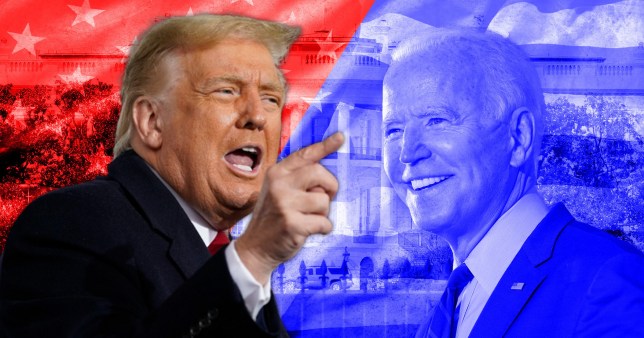Adapted from the writings of Dayan Yitzhak Grossman April 18, 2024 AP News reports: A…

Ineluctably Unelectable: Voting Issues in Halacha
Adapted from the writings of Dayan Yitzhak Grossman
November 26. 2020
The recent presidential election was the United States’ most controversial since 2000. Though the media projected early on that Joe Biden
was the winner of the contest, President Trump has forcefully and incessantly denounced that conclusion:
If you count the illegal votes, they can try to steal the election from us. . . . [Pennsylvania Democrats are] trying obviously to commit fraud. There’s no question about that. . . . [T]here’s tremendous corruption and fraud going on [in Georgia]. . . . [Mail-in voting is] a corrupt system and it makes people corrupt, even if they aren’t by nature, but they become corrupt.[1]
In this article and a follow-up, we survey some of the halachic literature on electoral fraud and related issues.
Voting “for the sake of Heaven”
The seminal halachic discussion of voting is a responsum of the Maharam of Rothenberg, who rules that when a community cannot reach a consensus regarding public affairs, the disputes are resolved by voting, and all eligible voters are adjured to express their opinions “for the sake of Heaven and for the well-being of the city.”[2] This implies that not only governmental officials, but even individual voters, must set aside any personal interest they may have in the matters at hand and vote according to their best disinterested assessment of the general community’s interest.[3]
R’ Eliezer Gordon of Telz, however, in the course of an analysis of whether relatives of a candidate for office are eligible to vote, grapples at length with the implications and scope of the Maharam’s requirement that every voter must express his opinion “for the sake of Heaven.” He concludes that at least in his case, relatives are nevertheless entitled to vote, after committing to express their opinion “for the sake of Heaven” to the extent possible. He explains that in principle, voters should have the right to vote however they please, even not “for the sake of Heaven,” because they are like partners in the community and they have the right to make decisions regarding the partnership as they see fit. The requirement to express their opinions “for the sake of Heaven” is merely a “takanah (corrective edict),” and since it is not the fault of the relatives that they are unable to be absolutely objective, we require merely that they commit to not be deliberately partial to their relative. Additionally, Rav Gordon notes that in his case the vote was not to choose the objectively superior candidate, since both candidates were equally qualified, but merely to determine the community’s preference.[4]
Vote buying, established and alleged: the Chasam Sofer
Based in part upon this fundamental insistence of the Maharam that voters must vote “for the sake of Heaven,” the Chasam Sofer rules that if a voter is paid for his vote, his vote is disqualified (and the voter himself is disqualified from voting in a repeat election regarding the same matter).[5] He also disqualifies a voter who accepts compensation for his vote on another ground: The Trumas Hadeshen rules that all public officials have the same eligibility requirements as judges, and a sinner may therefore not hold public office, just as he may not serve as a judge.[6] The Chasam Sofer makes the remarkable assumption that even individual voters who are deciding a public matter are held to the same standard as public officials and judges, and just as a judge who accepts compensation for judging—and a fortiori one who accepts a bribe—is disqualified, so, too, is a voter who accepts compensation for his vote disqualified.
The Chasam Sofer is emphatic, however, that in order to deprive the winner of the election of his victory, the testimony of two qualified, disinterested witnesses is required. Mere rumor is insufficient, as are the claims of local residents, their relatives, and relatives of the candidates,[7] and even the confessions of voters that they sold their votes and of buyers that they purchased them are not admissible as evidence.[8]
[1]Donald Trump White House Press Conference as Election Counts Continue. Transcript by rev.com.
[2]Hagahos Maimoniyos, Tefilah, perek 11 os 2 and Teshuvos Maimoniyos, Kinyan, siman 27, cited in Darkei Moshe C.M. beginning of siman 163 and codified by Rama ibid. seif 1.
[3]See Teshuvos R’ Eliezer Gordon teshuvah 4 os 4.
[4]Teshuvos R’ Eliezer ibid. osios 3-4,10. Cf. Shu”t Divrei Malkiel cheilek 1 siman 36 os 9 and cheilek 4 siman 83 s.v. Umah shechasumim who maintains that relatives are ineligible to vote because they are considered interested parties and there was never any intention to grant them the right to opine in such a case.
[5]Teshuvos R’ Eliezer ibid. osios 6-10 has a lengthy discussion of this point and ultimately disagrees with the Chasam Sofer and maintains that voters who return the money they received in compensation for their vote are eligible to vote in a repeat election.
[6]Shu”t Trumas Hadeshen Psakim Uchesavim siman 214, cited in Darkei Moshe ibid. beginning of siman 163, and codified by Rama ibid. siman 37 se’if 22.
[7]The Chasam Sofer mentions relatives of the winning candidate, but the same presumably holds true for relatives of the losing candidates.
[8]Shu”t Chasam Sofer C.M. siman 160, cited in Pis’chei Teshuvah ibid. siman 8 se’if katan 2.





